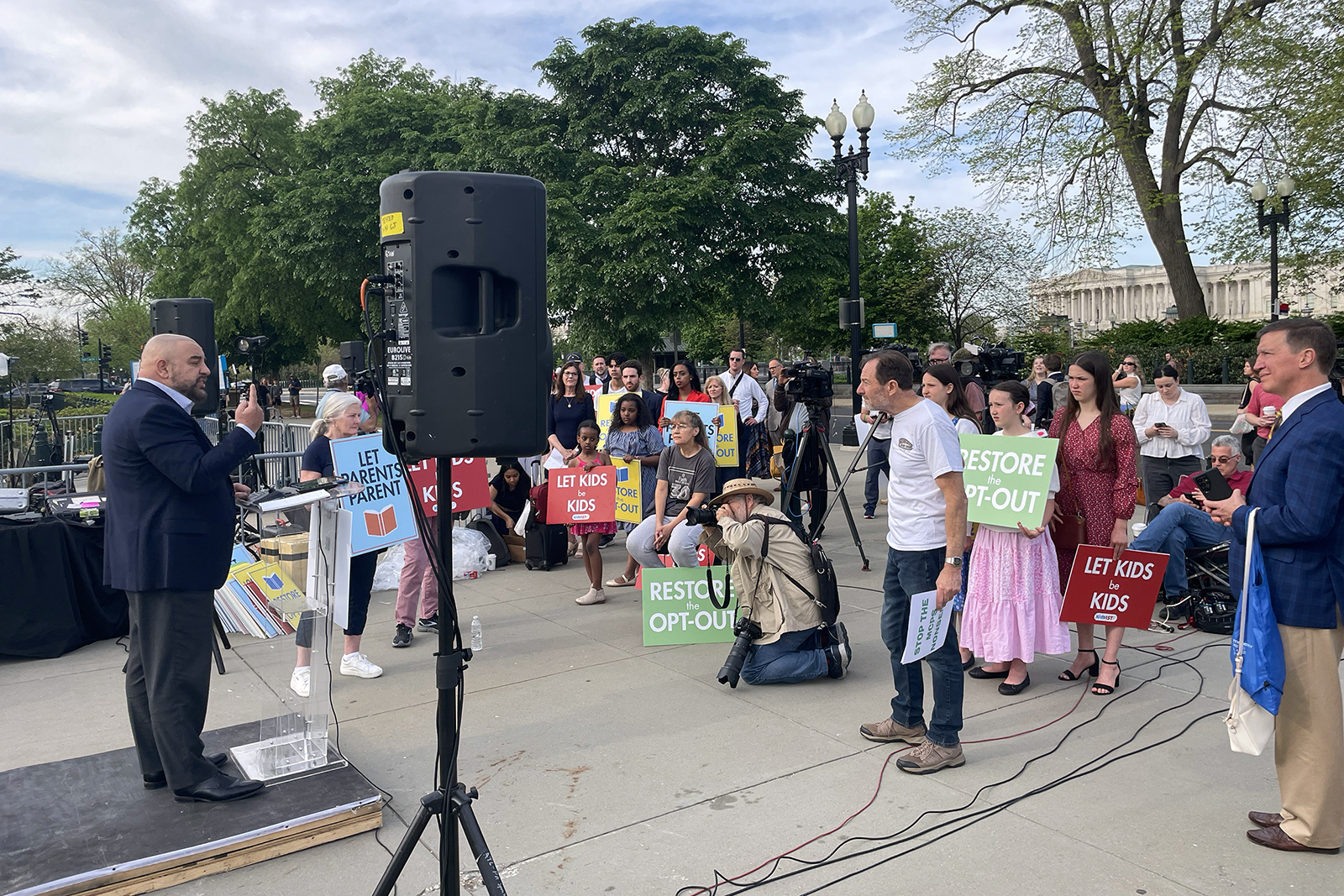
WASHINGTON (RNS) — On Tuesday (April 22), the Supreme Court heard arguments in a case set to determine the extent to which families can control what materials their children are exposed to in public school, as parents argued that learning from certain books may violate their religious beliefs.
Mahmoud v. Taylor was brought in 2022, after Maryland’s largest school district, Montgomery County Public Schools, introduced a fleet of books centering LGBTQ+ characters to their English language arts curriculum. The parents suing the district are led by Tamer Mahmoud and Enas Barakat, who are Muslim and removed their son from public school after a lower court sided against them. They are arguing against the school district and Superintendent Thomas Taylor.
As the court heard the case, parents and activists on both sides of the issue rallied outside, with many citing their faith as reasoning.
The Supreme Court seemed to signal its support for the religious rights of the parents against the district and is likely to determine it cannot require students to attend lessons involving books their parents have religious objections to, The Associated Press reported. A decision is expected by early summer.
The books, which are part of the county’s “culturally responsible collection,” are currently mandatory curricular items for kindergarten through fifth-grade students. The titles include “Born Ready: A Boy Named Penelope” by Jodie Patterson and “Uncle Bobby’s Wedding” by Sarah S. Brannen, which feature LGBTQ+ characters. Other books in the collection introduce students to a variety of cultures, such as “Sunday With Savta” by Wiley Blevins, about a Jewish family, and “I am Hua Mulan” by Qin Wenjun, set in China.
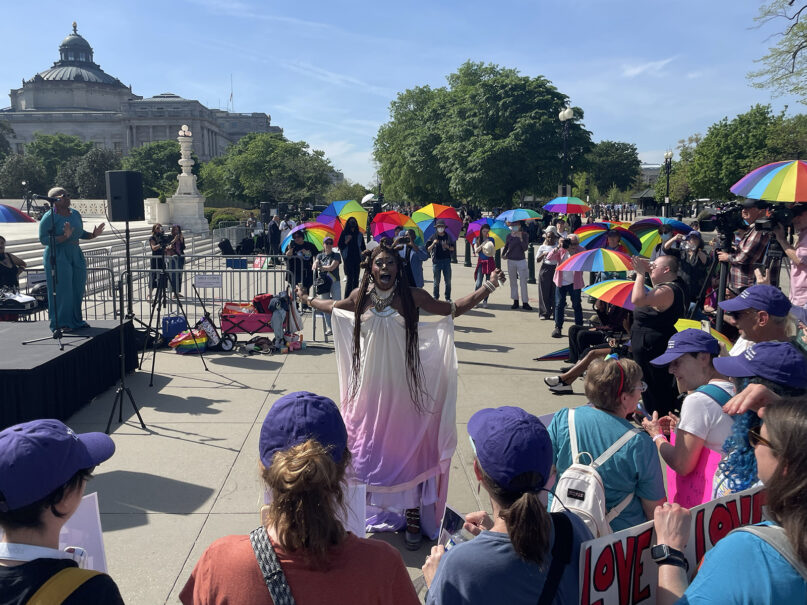
Drag queen Javon Love, center, performs during a rally in support of a school district’s ability to control curriculum, outside the Supreme Court in Washington, April 22, 2025. (Photo by Reina Coulibaly)
An interfaith group of parents — representing Catholic, Muslim, Ukrainian Orthodox and other faiths — is not suing for removal of the books with LGBTQ+ characters from the curriculum, said Wael Elkoshairi, a former MCPS parent who is Muslim. Rather, they are asking that the court codify a right to “opt out” of specific materials the families deem offensive to their religious beliefs, and that they receive prior notification of any classroom instructions involving the content.
“We are asking for accommodation. We did not ask them to remove the books or change their curriculum,” said Elkoshairi, who is now sending his daughter to private school. “With MCPS, teachers are reading books that contradict some of our religious beliefs.”
Elkoshairi spoke to approximately 35 parental religious rights proponents who gathered outside the Supreme Court for a rally while the case was being heard. Many held up brightly colored posters with slogans such as “Restore the Opt-Out,” “Let Kids be Kids” and “Let Parents Parent.”
The parents said they consider the inclusion of books with LGBTQ+ themes to be premature introductions to religiously sensitive topics, effectively inhibiting their ability to raise their children in line with their faith practices.
“Parents know their children best,” said Grace Morrison, a plaintiff in the case and Catholic mother of seven. “We understand their unique needs, their strengths and their vulnerabilities. No government authority should be able to override our fundamental duty to guide our children’s education consistent with our beliefs. Today, we ask the Supreme Court to protect our freedom to raise our children according to our faith. A child’s innocence, once lost, is gone forever.”
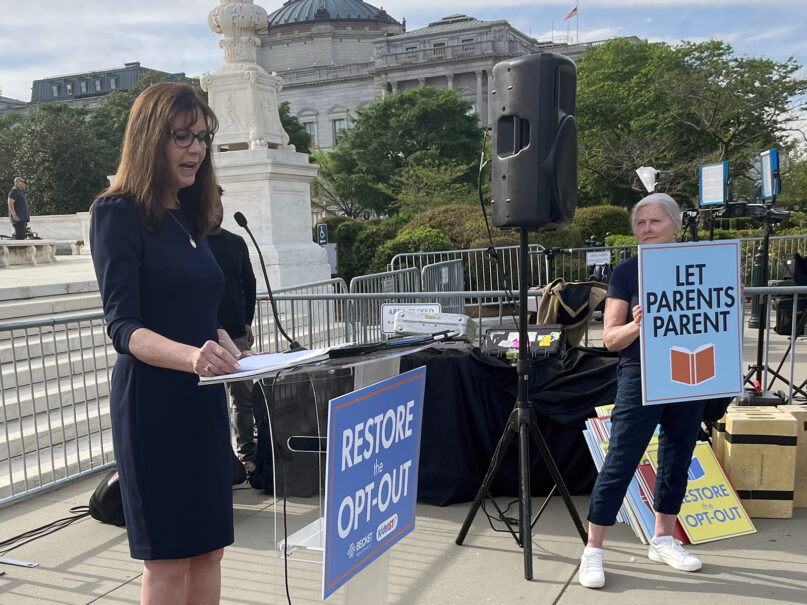
Grace Morrison, left, speaks to supporters of opt-out options for parents, after oral arguments in the Mahmoud v. Taylor case, at the Supreme Court in Washington, April 22, 2025. (Photo by Reina Coulibaly)
Morrison said she joined the lawsuit because she has a daughter with Down syndrome and her disability made explaining LGBTQ+ subject matter in relation to their family’s Catholic beliefs difficult.
“The school board has taken away my family’s ability to raise her according to our faith. Given her learning challenges, she struggles to grasp why her parents and teachers might disagree,” Morrison said. “This makes it nearly impossible for my husband and me to explain the conflicts that arise when a teacher says something that contradicts our faith.”
MCPS’ current policy prohibits parental notification and opt-outs of such subject matter out of concerns about excessive absenteeism and targeted harassment of LGBTQ+ students and families. Lower courts have sided with the school district, and a federal appeals court decided the parents had not demonstrated their children’s exposure to the books would violate their religion.
“There is no explicit instruction on gender and sexual identity in elementary school as part of content instruction,” wrote MCPS in a list of FAQs on the culturally responsible curriculum. “Diversifying texts in elementary school will help young people develop empathy for a diverse group of people and learn about identities that might relate to their families or community members.”
The school district added “there is no LGBTQ+ curriculum in elementary schools.” It said that through these books, “students are learning the curriculum indicators outlined for each grade level,” which are meant to help them learn how to determine a theme of a story, summarize text and other reading comprehension skills.
Outside of the courthouse, another group of parents and activists gathered less than 50 feet away, rallying in support of the inclusive curriculum. Sponsored by local advocacy organizations Montgomery County Pride Center, Trans Maryland and Live in Your Truth, that rally included about 60 people.
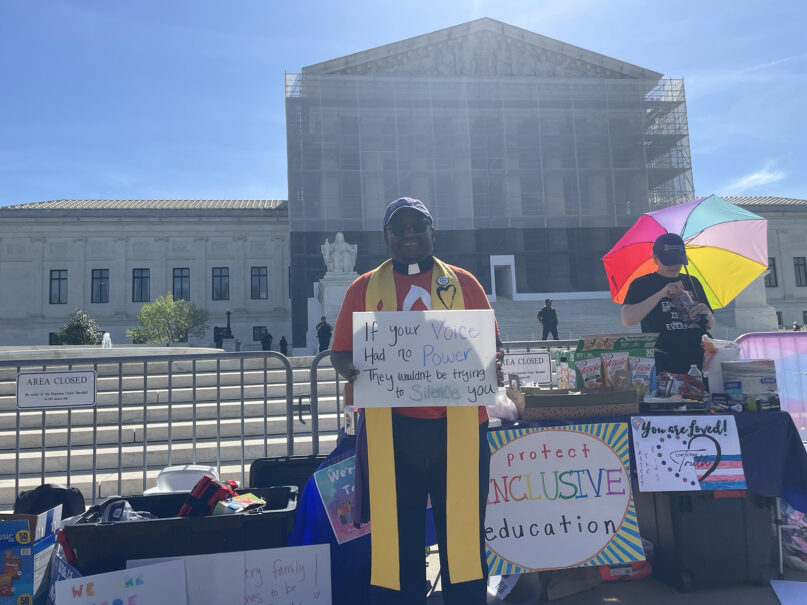
The Rev. Ali Kofi Bell attends a rally in support of the school district outside the Supreme Court in Washington, April 22, 2025. (Photo by Reina Coulibaly)
The parents siding with the school district argued that their families and others could be discriminated against if other parents can opt out of the inclusive curriculum. A row of volunteers carrying large rainbow umbrellas stood with their backs to the plaintiff-supporting group, blocking them from view of their rally’s attendees. On a small stage, organizers, religious leaders and community members spoke in support of the LGBTQ+ books. A local drag queen, Javon Love, gave a lively performance to “Free Your Mind“ by En Vogue.
Those supporting the school district represented religious traditions including Reform Judaism, Unitarian Universalism, Islam, the Religious Society of Friends and Episcopal denominations, and they cited their religious values in guiding their support of the curriculum.
“I just want people to know that we don’t have to be divided,” said the Rev. Ali Kofi Bell, a Unitarian Universalist minister and MCPS parent. “We can have different ideas, different perspectives and different faiths, and still be working for the best interest of all our children.”
Bell said he believed families against the curriculum also feel they are advocating for their children’s best interests — they just have different beliefs about what their children should learn. Moreover, Bell, who is transgender, argued that limiting students’ exposure to diversity through opt-outs can ultimately be harmful to their sense of faith down the line.
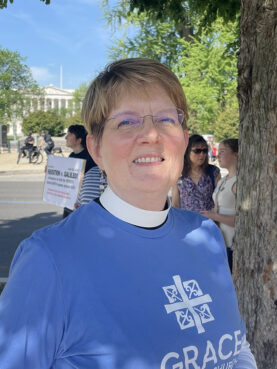
The Rev. Sarah Odderstol. (Photo by Reina Coulibaly)
“This is how we grow people who have good critical thinking skills, so that they are not just reciting what they believe, but they actually have a belief deeply seated in who they are and how they understand theology,” he said.
Other proponents of the inclusive curriculum consider the case as a harbinger of more extreme limits on public school curricula to come.
“I think it’s shortsighted of parents to try and protect their kids from life,” said the Rev. Sarah Odderstol, rector at Grace Episcopal Church in Montgomery County. “Don’t you want to have these conversations with your children? Statistically, you are going to have (LGBTQ+) friends and family in your life, and I think exposure is a good thing.”
She attended the rally to advocate for LGBTQ+ congregants and their families who she said will be negatively affected if the Supreme Court legalizes opt-outs.
“If we start silencing people and censoring what can be taught in public school, everybody’s rights are in trouble,” she said.
